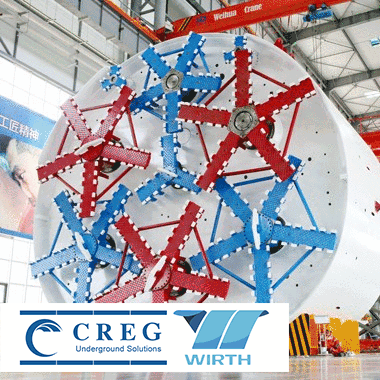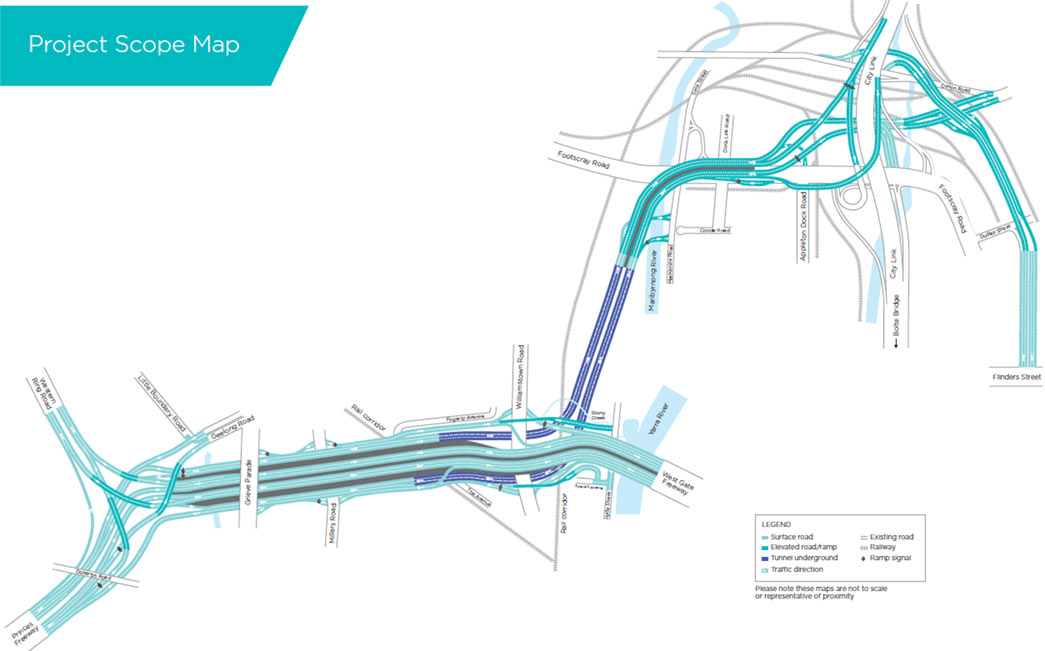West Gate TBMs remain idle in Melbourne 18 Mar 2021
TBM excavation of the new West Gate highway in Melbourne remains on hold with a “range of issues” still to be resolved, project owner Transurban admitted in its latest financial results. Launch of the two 15.6m diameter TBMs has been delayed since assembly of the machines in 2019.
The outstanding issues include a lack of approved disposal sites for contaminated ground identified during the site investigation and classified as hazardous after award of contract and mobilisation of the TBMs. A tender process underway by construction JV CPB Contractors-John Holland involves securing planning and environmental approvals for potential disposal sites.
Some 1.5 million m3 of muck will be excavated by the twin tube TBM drives, with low levels of contamination by carcinogenic chemicals known as per- and polyfluorinated alkyl substances found at a number of points along the alignments.
The continued delay has resulted in a further setback to the timeline for completion with Transurban, which is developing the project in partnership with the Victorian State Government, confirming that a revised target opening date in 2023 will not be met and that it is unable to set a finishing date on the project. The scheme was originally scheduled to open in 2022.
The two TBMs are assembled in the Footscray launch shaft at the northern portal in Yarraville, west of Melbourne, TunnelTalk was informed in an emailed statement from Victoria State Government delivery partner, West Gate Tunnel Project. A maintenance schedule has been developed in partnership with the manufacturer to ensure the machines remain operable and ready to be fully commissioned when a launch date is confirmed. “We look forward to starting TBM excavation later this year, subject to Transurban and CPB Contractors-John Holland selecting a site to dispose of the muck,” said the statement.
Current activity at the portal sites includes installation of the final lining and roof deck beams. Crews are also undertaking slipform work around the TBMs to prepare for construction of the surface roads that will connect the underground drives to new bridges over the Maribyrnong River to the north (Fig 1). Production of the precast segmental lining is continuing at a facility in Benalla, about 200km and two hour’s drive northeast of Melbourne, with more than 50% of the segments cast to date.
The ongoing challenges will result in “substantial cost overruns”, said Transurban CEO Scott Charlton on a call with business analysts in February 2021 – how much more than its original AUS$6.7 billion estimate is unknown. According to local news reports, the scale of cost increase could run to billions of dollars.
“We are progressing toward tunnelling commencement,” said Charlton, “but at this stage, disposal sites participating in the contractor-led tender process would not be ready to accept spoil soon enough to enable a 2023 completion.” Charlton also admitted the risks associated with the project had not been adequately assessed.
Late last year, the Victoria State Environmental Protection Authority rescinded three permits to dispose of contaminated muck at landfills in Bacchus Marsh, Ravenhall and Bulla, admitting it had not met State Government regulations when approving the Bacchus March site. While it remained satisfied the two other permits “met the strict conditions designed to protect human health and the environment, for avoidance of doubt, new applications for all three sites need to be submitted.” A fourth site in Wyndham Vale is also being investigated as a potential temporary back-up site.
The news is a further blow for stock exchange listed Transurban, after its toll revenues slumped during the Covid-19 pandemic, leading to a AUS$448 million loss in the six months to December 2020. Average daily traffic on the Transurban network of toll highways in Australia is down 17.8%, despite opening the WestConnex M4 underground highway in 2019 and NorthConnex and WestConnex M8 underground routes in 2020, all in Sydney. The Melbourne market has been particularly impacted with toll revenue down 39.1% and average daily traffic down 47.8% in the Victoria State capital.
The West Gate project comprises a 4km and a 2.8km underground alignment, as well as widening of an existing surface highway, construction of a new bridge over the Maribyrnong River, and new connections to the city and to the CityLink highway to the northeast. When complete, it will link the new northern city centre bypass highway to the existing M1 corridor. It is one of a number of operating and planned projects that Transurban manages and is developing in Melbourne (Fig 2).
The ongoing challenges faced by the West Gate scheme brought sharp criticism from Victoria State Minister for Transport Jacinta Allen who called it a “fundamental failure of Transurban and its contractors”, adding that the companies should “get on and resolve the issue, so we can see this vital project delivered.”
References
- Mega TBM arrives in Melbourne – TunnelTalk, March 2019
- Melbourne progresses Rail Loop early works – TunnelTalk, December 2020
Contaminated soil delays Melbourne West Gate TBMs 23 Apr 2020
Two 15.6m diameter Herrenknecht TBMs procured by the CPB Contractors-John Holland JV to excavate the twin tubes of the West Gate highway in Melbourne are assembled but lying idle following issues with the management of contaminated soil. The ground through which the TBMs will bore is contaminated with carcinogenic chemicals known as per- and polyfluorinated alkyl substances, PFAS. The first machine was due to begin excavation on the 4km long tube in mid-2019 after arriving in Melbourne from the Herrenknnecht factory in China in March. The cutterhead, as the last assembly component of the first TBM was reported as lifted into the Footscray launch shaft in August 2019. The second mega TBM arrived in March 2019 for the second 2.6km twin tube but tunnelling by either is yet to begin (Fig 2).
PFAS have been used for decades in a range of non-stick, water- and fire-repellent and stain resistant products. Recently, the health implications of PFAS exposure have raised concern, as the chemicals resist physical, chemical and biological degradation and are readily leached into groundwater from where they may enter the food chain.
“Historically, PFAS was an unregulated contaminant and was considered fill material,” said Scott Carlton, Chief Executive of Transurban, the client organisation developing the project under a public private partnership with the State Government of Victoria. In a conference call in February with financial analysts he explained that that arrangement has been evolving over the last few years with the result that a spoil management plan for the project is now required by the State EPA, Environmental Protection Authority. “Everyone has been aware of the issue for a long period of time,” said Carlton. “It was discussed in the environment effects statement, EES, and the way the EPA is looking to manage it has been evolving.”
The West Gate Tunnel Project EES was prepared for Transurban by AECOM and geotechnical assessment was undertaken by Golder Associates with GHD engaged as the technical advisor to the State on the project. The Aurecon-Jacobs JV is the design engineering is undertaken for the CPB-John Holland JV (CPBJH).
The EPA did not respond to requests for comment for the article but in its submission to the 2017 EES, the EPA had warned that PFAS have recently been the “focus of health and environmental investigations” and subject to “increased environmental regulatory focus”. It also noted that there were “limited options available in Victoria for managing or disposing of PFAS-impacted waste”. In 2019, the EPA updated its regulatory stance on PFAS in an interim position statement, following the publication of a national environmental management plan (NEMP) for PFAS in Australia in 2018. Preparation of an NEMP update is underway.
The challenge is to find a disposal site that can take the PFAS-contaminated muck and in the quantity and at the speed with which it will be produced. “We have been working with the contractor, the EPA and the State to try and find a solution,” said Charlton, but “at the moment, there is no site capable of taking the spoil”.
As a result of the issues, Transurban said in January 2020 that it had received documentation from the CPBJH that purported to terminate its contract as it relates to “issues in respect of the presence, classification and disposal of PFAS within the project site”, with the JV agreeing to continue to work on other aspects of its West Gate project contract.
CPBJH declined to comment for the article and the contract appears to remain in place, despite the January notification. In an emailed statement to TunnelTalk, Transurban said that, although details of contractual discussion were “a matter for the project parties”, CPBJH was now “working to finalise plans to tunnelling and secure sites for the safe management of tunnel soil”. That process was said to be still underway and that “no decisions have been made”.
This was confirmed by the Major Transport Infrastructure Authority of the State Government, which said in a statement that a tender process to source an appropriate site for disposal of the PFAS-contaminated spoil was currently being carried out by the project partners. Meanwhile, construction has been continuing at the portal locations with tunnel excavation to start as soon as a long-term sustainable solution to the disposal of the spoil is finalised. The TBMs have been assembled and are on standby to be ready to start once a solution is found.
Sites bidding to provide the disposal facility would need to seek relevant planning and EPA approvals, which will set the limit of PFAS that can be stored safely, Transurban said in an early April update. “As it stands, we are currently reviewing the project,” said Charlton in the February analysts call. “The contractor has informed us that the project is unlikely to be completed by the end of 2022 due date. We are working closely with our project partners to implement opportunities that would enable us to deliver the project on time.”
Construction is ongoing on other elements of the project, including the widening of the surface highway, the construction of a bridge over the Maribyrnong River and new connections to the city and to the CityLink highway to the south east of the Melbourne city centre (Fig 1). To date, about AUD$2 billion has been spent on the project.
Transurban is also involved in the development of the NorthConnex and WestConnex highway projects in Sydney, both of which include significant underground works. In addition to the problems with the West Gate project, Transurban is facing economic pressure from the current COVID-19 pandemic which has seen traffic on the company operated toll roads in Melbourne, Sydney, Brisbane and North America fall dramatically. As a result, the stockmarket-listed company has withdrawn its second-half dividend guidance.
References
- Mega TBM arrives in Melbourne – TunnelTalk, March 2019
- Melbourne Westgate highway approved – TunnelTalk, December 2017
- Two mega-TBMs for Melbourne highway tunnel – TunnelTalk, April 2017
- Shortlist for Melbourne underground highway – TunnelTalk, September 2019
|
|
|
|
|
Add your comment
- Thank you for taking the time to share your thoughts and comments. You share in the wider tunnelling community, so please keep your comments smart and civil. Don't attack other readers personally, and keep your language professional.






